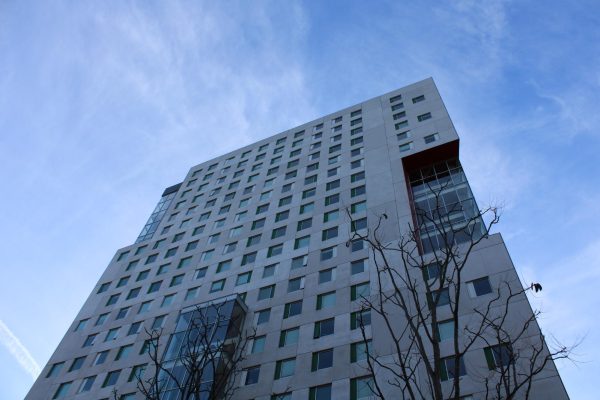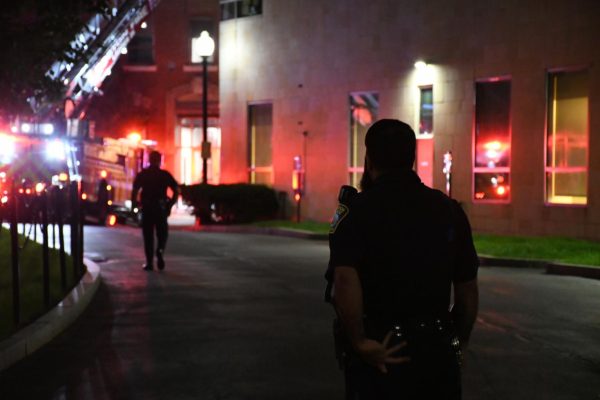NEU SpeakOut highlights a culture of sexual assault within Greek life
Content Warning: This story discusses sexual assault and rape.
When crossing through the doorway of a fraternity house on Mission Hill, many Northeastern students surrender themselves to the reality that at some point, amidst the deafening music blaring over the crowd of sweaty bodies, they will experience some form of unwanted touching. It’s not uncommon for women to experience forms of sexual assault while at a fraternity party — whether they’re grabbed by the hips, groped from behind, subjected to degrading verbal advances or taken upstairs and raped.
In August 2020, members of Northeastern’s Sexual Assault Response Coalition, or SARC, created an Instagram account called Northeastern SpeakOut, or NEU Speakout, to “provide a safe and supportive space for survivors to share their stories and raise awareness around the pervasiveness of sexual violence” on campus, according to their mission statement. In January 2021, the account began posting survivors’ accounts more frequently and the following rapidly increased. Now, it broadcasts anonymous statements from survivors of sexual violence to over 1,200 followers.
At least one in five women and one in 16 men who attend college will experience sexual violence at some point during their education.
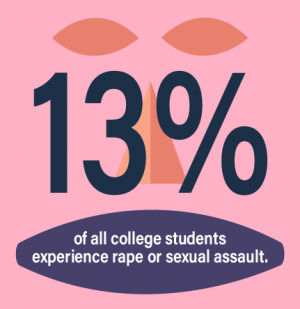
The university defines sexual assault as a sexual act directed against another person without consent, including rape, statutory rape, sodomy, assaults using objects and fondling.
When compared to their non-Greek-affiliated counterparts, research suggests women in sororities are four times more likely to experience sexual assault, and men in fraternities are three times more likely to perpetrate rape and other forms of sexual assault.
A majority of the statements on NEU SpeakOut describe experiences that occurred during or after a fraternity party or involve a member of a fraternity perpetrating sexual violence.
In response, SARC is advocating for the university’s adoption of two new Title IX policies. Both are directed at Greek life and are outlined in a change.org petition with over 2,000 signatures. First, students are demanding the university ban all Greek life organizations from holding internal sexual misconduct investigations, trials and cases. Second, they want all Greek organizations to participate in mandatory sexual violence prevention and education training once a semester.
“Frat parties are hotbeds for sexual assault,” said Sydney Wise, a fourth-year political science and international affairs major and a member of the Kappa Delta sorority, or KD.
When Wise saw survivors come forward on NEU SpeakOut, she said it “lit a fire inside” her and gave her the strength to bring forward a Title IX case against her perpetrator, a member of Greek life who assaulted her in 2018.
Title IX is a federal civil rights law that prohibits sexual discrimination at any educational institution that receives federal money.
Serving on this committee has been a means to reclaim my power and to use my experience [with sexual violence] as something to draw authority from.
— Sydney Wise
According to Wise, KD has terminated all engagement with Northeastern fraternities and will remain unaffiliated until they see meaningful progress in relation to sexual assault education and prevention. The chapter has also developed a sexual assault action committee that is drafting guidelines to regulate fraternities’ behavior both internally and with sororities.
“Fundamentally, sexual assault is about taking your power away from you,” said Wise, who is one of six members on the committee. “For me, serving on this committee has been a means to reclaim my power and to use my experience [with sexual violence] as something to draw authority from.”
Pavan Hirpara is a third-year computer science major, a member of the Alpha Kappa Sigma fraternity and the president of Northeastern’s Interfraternity Council, or IFC, which oversees the nine fraternities on campus and was founded to “positively impact the development of men.” Hirpara was stunned by how frequently fraternities were mentioned on NEU SpeakOut.
“I see fraternities as a source of support and opportunities for growth, so when some information comes that is opposite of what I believe, I’m going to be surprised,” Hirpara said. “It was shocking to see.”
Hirpara said he didn’t expect to see people and organizations he knew personally being cited as a part of this problem and said that the IFC and their chapters need to do better. As a direct result of NEU SpeakOut and SARC’s work, Hirpara said sexual assault has been discussed more frequently this semester than in the past.
For over a thousand students this is now a part of their weekly life and it may not have been before. At least it’s not being ignored the same way it was before.
— Liisa Balazs
Hirpara said when fraternities engage in internal investigations, which the SARC petition seeks to ban, “it does more harm than good.” He agrees the process should be conducted by trauma-informed professionals.
Wise said she understands why SARC has proposed the ban of internal investigations but also does not think the university has done enough work to adequately provide justice for survivors.
“By shifting responsibilities from frats to Northeastern, we’re not addressing the problem,” she said. The real problem, she said, is rape culture and Title IX itself.
In May 2020, former U.S. Secretary of Education Betsy Devos amended the federal guidelines, forcing Northeastern to update its policy in accordance with several changes that would narrow the scope of cases the school had to take on and change the way the cases were investigated. Notably, the new federal policy requires universities to conduct live cross-examinations, which resemble a criminal trial and have been widely criticized for putting an unnecessary burden on victims, deepening survivors’ trauma through exposure to the accused and allowing for questions that seek to disprove a victim’s story.
A source spoke with The News about her experience with Northeastern’s Title IX process and requested anonymity fearing that speaking publicly would interfere with her case.
When the source reported her assault to the Office of Education and Prevention at Northeastern, or OPEN, they referred her to the Office for University Equity and Compliance, or OUEC, where she said they asked her uncomfortable questions like how much she weighed at the time and how much she drank that night.
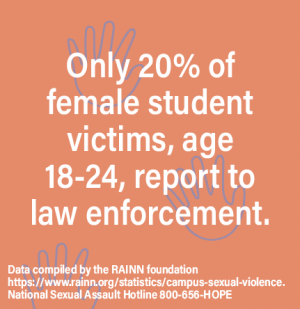
Northeastern’s Title IX policy says “the goal is to have Informal and Formal Resolution Procedures completed in approximately 90 days after a Formal Complaint is made.” However, OUEC has suggested to the source, who said she filed her report in early February, that she might not see a resolution before she graduates in May.
The anonymous source said she was never confident the “slow” and “bureaucratic” Title IX process would bring her justice, but she wanted her assaulter to know that she’s not afraid and that he’s not invisible. She submitted her case to OUEC accepting that she was about to experience “an entire semester of re-traumatization.”
According to Liisa Balazs, the IFC and KD are not the only Greek life organizations responding to allegations made on Instagram. Balazs, a fourth-year political science and business administration major and the vice president of SARC, said that many student-led organizations and administrators have reached out to SARC to ask how they can collaborate.
Balazs said the most immediate impact of NEU SpeakOut is how the recent posts have ignited campus-wide conversations. Even though this is not a new issue, she said the account has made it impossible for students and administrators to look away from what Wise calls the “sexual assault pandemic.”
“For over a thousand students this is now a part of their weekly life and it may not have been before,” Balazs said. “At least it’s not being ignored the same way it was before.”
SARC is working directly with administrators in the Office of University Education and Compliance, or OUEC, like Title IX Coordinator Mark Jannoni, who oversees the investigation and resolution of all reports of discrimination on campus, including sexual discrimination and violence.
Over the course of Jannoni’s five years at Northeastern, the number of reported cases of sexual violence has grown steadily. This trend excludes 2020, as the pandemic has limited all types of in-person interaction among students. He credits the rise in reports to the increased resources devoted to educating students on their rights and the resources available to them.
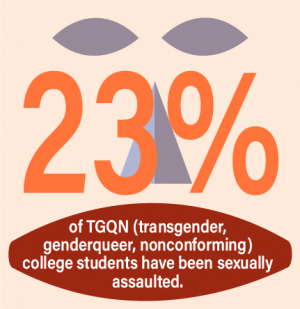
Nationally, rape is the most underreported crime: Only 25% of all sexual attacks were reported to the police in 2018, and 90% of sexual assault victims on U.S. college campuses do not report it.
Casey Corcoran is the director of youth sexual violence prevention education at the Boston Area Rape Crisis Center, or BARCC. Corcoran said he sees “a million” factors that drive low reporting, including shame, self-blame and the fact that sexual violence disproportionately impacts individuals who may already have negative perceptions about law enforcement and the criminal justice system, such as Black women, Latinx women and members of the LGBTQ+ community.
Additionally, Corcoran said the Title IX process is flawed and places too much emphasis on false reporting, which only accounts for about 2-10% of reports.
While Balazs was involved in drafting the SARC petition and works closely with OUEC, she expressed similar doubts about the capacity of Title IX.
“It’s almost so overwhelming to think about because [Title IX reform] is so important, but it’s such a small fraction of the problem,” Balazs said. “No matter how much we change the Title IX policy, no matter how much we advocate, it’s a society and cultural problem. It is rape culture that needs to change.”
Jannoni understands why students criticize policies like live cross-examinations, but said the university has no choice but to abide by the “extremely prescriptive” federal Title IX laws.
The second aspect of the petition brought forward by SARC addresses education aimed at confronting rape culture and sexual assault prevention. Balazs said she and other members of SARC want to see conversations about consent, sexual health and the patriarchy. Corcoran said in order to prevent this violence, increased education is needed to correct cultural attitudes that are deeply ingrained in young boys.
Rape culture refers to the environments in which pervasive sexual violence is enabled and normalized through societal attitudes about sexuality and gender, said Corcoran. Rape culture, while certainly not specific to Greek life, festers in environments like fraternity houses where hyper-masculinity and hetero-normativity are accepted as the norm.
We have a lot of unhealthy cultural norms around masculinity in our culture.
— Casey Corona
“We have a lot of unhealthy cultural norms around masculinity in our culture,” Corcoran said. These norms include “normalizing power as an overriding male value” and the “boys will be boys mentality.” He also said men are trained to believe that sex is something to be achieved and that men are inherently more sexual, a notion that is harmful to women and to men who experience sexual violence.
As a survivor in a sorority, Wise is acutely aware of how “Greek life institutionalizes a hierarchy where men are providers and women are receivers.” She referred to the fact that men host the parties, men give out the drinks and men have bedrooms upstairs that afford them physical power. She wants to see an analysis of “language that constructs the narrative that women have something to be grateful for from the men in Greek life,” referring to the notion that it’s perceived to be a “privilege” to be “able to get in” to a frat party.
“But then no one talks about what happens to you once you get inside,” she said.
Corcoran also said education needs to more appropriately address the role that alcohol plays in sexual violence.
“Alcohol does not make someone perpetuate sexual violence. In fact, alcohol is the most commonly used date rape drug — it’s used as a tool to perpetrate sexual violence,” Corcoran said.
He said he thinks too often education about alcohol and sexual violence puts the burden on the person who may be victimized, referring to the fact that women have likely been taught to cover their drink or limit alcohol consumption.
He also said education often focuses on harm reduction after the fact, but “we also need to be telling people: don’t assault people,” he said.
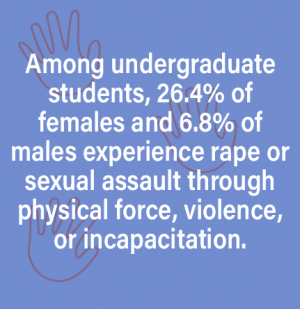
Wise and Balazs both agree that education needs to be focused more heavily on teaching perpetrators not to engage in sexual violence. Hirpara said he sees a need for education directed towards supporting survivors, responding to disclosures and teaching bystanders to intervene.
According to Senior Vice Chancellor for Student Affairs Madeleine Estabrook, the Sexual Violence Resource Center in OPEN has developed extensive education resources relating to sexual violence, including bystander intervention training. The 2019 climate survey indicated the efficacy of OPEN’s training in education students. However, many of these programs are optional.
Jannoni met with members of SARC and leaders of Greek life to discuss SARC’s petition, which he supports and said is poised to be implemented.
According to statistics published by the Northeastern Office of Student Conduct and Compliance, in 2018-2019 the university’s Title IX Board took 24 cases of sexual assault and nearly half of them didn’t come to a formal resolution.
Jannoni said the number of reports filed in a given year is “considerably higher” than 24.
The university does not publically disclose statistics on the reports filed through OPEN and declined to provide The News with a numerical estimation of annual reports of sexual violence in the Northeastern community.
However, if figures at Northeastern are in-line with national trends reported by the CDC, it could be estimated that in a given year, over 2,100 female students on campus — a majority being members of a sorority— have experienced sexual violence in some form.
Updated at 1:08 pm April 2nd to correct Wise’s graduation year.
Editor’s note: The Huntington News wants students to know Northeastern University and others provide sexual assault resources for students.
- WeCare: [email protected], 617-373-7591, 226 Curry Student Center
- NU Office of Prevention and Education at Northeastern: 617-373-8354
- University Health andCounseling Services (UHCS): [email protected], 617-373-2772, Forsyth Building, 1st Floor
- 24/7 Mental Health Support: for students by phone 877-233-9477 (U.S.)
- Boston Area Rape Crisis Center: 1-800-841-8371
- Crisis Text Line: Connect with a trained crisis counselor to receive free, 24/7 crisis support via text message – Text NAMI to741-741 (U.S. & Canada)
- Suicide Prevention Hotline: 1-800-273-8255







